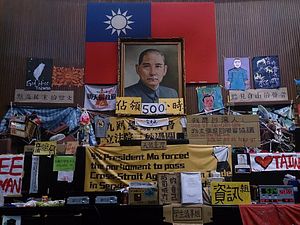Nearly three weeks after a group of Taiwanese protestors occupied the Legislative Yuan to show their opposition to a proposed services pact with China, the protestors have announced they plan to leave the LY on Thursday. Student leader Chen Wei-ting made the announcement Monday after debates among the protestors.
The announcement came after Wang Jin-pyng, speaker of the Legislative Yuan, offered concessions to the protestors. The participants in the Sunflower Movement had made a number of demands, most importantly requesting further review of the proposed Cross-Strait Service Trade Agreement (CSSTA) and the creation of a legislative mechanism to oversee future cross-strait activities. Taiwan’s President, Ma Ying-jeou, had previously denied these requests, sparking a massive rally (estimates ranged from 116,000 to 500,000 people) outside the Presidential Office on March 30.
On Sunday, though, Wang announced that he would meet the protestors’ two main demands by promising not to hold any further inter-party negotiations on the CSSTA until the legislature has passed a law to oversee cross-strait negotiations and agreements. In response, Chen Wei-ting claimed victory on behalf of the protestors. “The students and civil groups have halted the forced passage of the agreement and demonstrated that Ma’s administration’s has lost legitimacy,” he said.
According to the Taipei Times, the Presidential Office and the Executive Yuan were both caught off guard by Wang’s promise. Though Wang is a member of the Chinese Nationalist Party (KMT), led by Ma Ying-jeou, the two men have had their differences in the past—including a recent legal battle rumored to have been motivated in part by Wang’s lenience toward the opposition party’s legislative stalling tactics.
In response to Wang’s announcement, Ma convened a meeting of KMT lawmakers to discuss a way forward. While Ma said in a statement that there was no conflict between Wang’s promise and the government’s previous pledge to do a line-by-line review of the CSSTA, Ma also expressed his hope that the review could take place simultaneously with deliberations on the creation of a cross-strait monitoring mechanism. Premier Jiang Yi-huah reiterated this position, warning that it could take up to two years to pass the bill for a monitoring mechanism. Jiang said that Taiwan must ratify CSSTA before 2016 or face economic consequences.
Though the protestors might be leaving the LY within a few days, their leaders made it clear that the Sunflower Movement is not over. “We have shown how the ‘sovereignty of the people’ promised by the Constitution can be realized and become a real-life experience for our generation,” Chen said, adding that Taiwan’s young people “will shift our strategy from the defensive to one that is ready to attack.”
Chen’s words hinted at a sea-change in the way Taiwan approaches cross-strait relations, which are presently handled exclusively by the ruling KMT party of Taiwan and the Communist Party of China. “From this moment on, no behind closed doors negotiation is allowed; no regime can be permitted to make brazen moves to sell out Taiwan,” Chen said. “We Taiwanese, not anybody else, are the masters of this island.” Chen and other members of the Sunflower Movement have made it clear they intend to continue to voice their opinions on Taiwan’s future, especially as pertains to cross-strait relations.
































